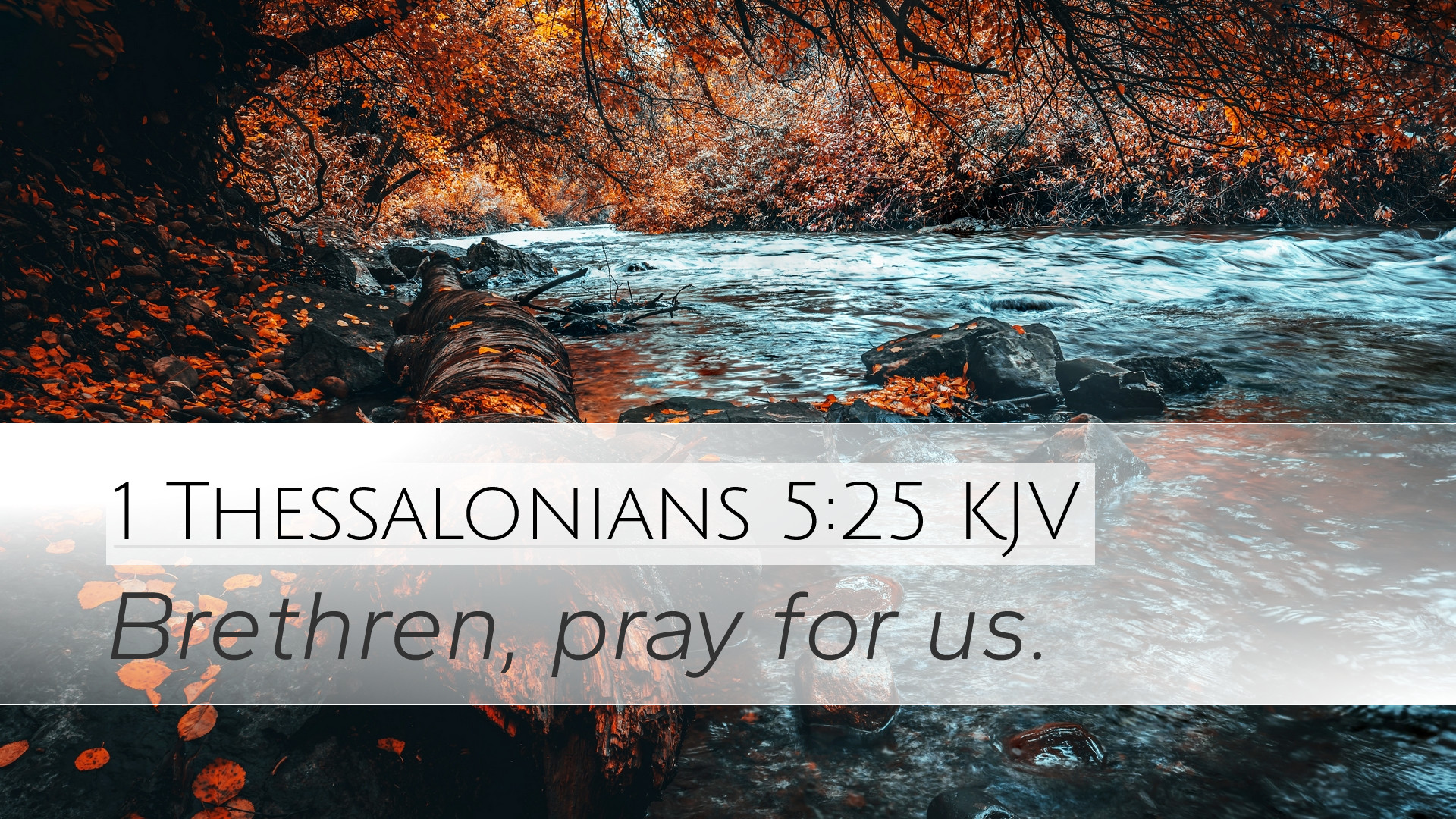Commentary on 1 Thessalonians 5:25
Bible Verse: "Brethren, pray for us." (1 Thessalonians 5:25)
Introduction
The Apostle Paul, in his first epistle to the Thessalonians, concludes with a series of exhortations that underpin the communal and spiritual responsibilities of the early Church. Among them, he includes a simple but profound request: "Brethren, pray for us." This verse encapsulates themes of intercession, community, and mutual support. The insights drawn from the public domain commentaries illuminate the significance of this verse for pastors, students, and scholars alike.
Exegesis and Context
This request for prayer arises within a broader context where Paul has been discussing the obligations and moral duties of living within a Christian community. The call to prayer indicates not only Paul's humility but also the recognition of the communal responsibility in spiritual matters.
- Paul’s Vulnerability: As evidenced by Matthew Henry, Paul’s appeal for prayer signifies his own acknowledgment of dependence on God and the church. This reveals a profound example of humility and an understanding that even apostles require the prayers and support of fellow believers.
- The Ministry of Intercession: Albert Barnes notes that intercessory prayer plays a crucial role in the life of the Church. Paul’s ministry was under constant spiritual warfare, and he recognized the power of collective prayer. This encourages pastoral leaders to seek prayer support within their congregations.
- The Bond of Brotherhood: Adam Clarke emphasizes that Paul's use of the term "brethren" indicates a close-knit relationship among believers, suggesting that prayer is an expression of love and care within the Christian community.
Theological Implications
The request to "pray for us" underscores several theological themes relevant to understanding the Christian faith:
- Interdependence in the Body of Christ: The New Testament often alludes to the Church as the body of Christ. Each member is vital, and intercessory prayer demonstrates this interdependence, reflecting how the spiritual well-being of one can affect the whole.
- The Power of Prayer: Both Henry and Barnes highlight that prayer is not merely a ritual; it is powerful and effective. James 5:16 supports this by reminding believers that "the prayer of a righteous person is powerful and effective." This underscores the significance of collective prayer in supporting God’s work through His messengers.
- Spiritual Warfare: The call to pray can also be related to the concept of spiritual warfare discussed throughout the New Testament. Paul understood the opposition he faced and sought the Church's prayer support for spiritual strength and wisdom.
Application for Pastors and Theologians
For those in pastoral ministry and theological studies, 1 Thessalonians 5:25 serves as a critical reminder of several key points:
- Encouragement of Prayer: Pastors should actively encourage their congregations to engage in prayer, emphasizing its vital role in ministry. Prayer meetings, intercessory groups, and church-wide prayer initiatives can be ways to foster this culture.
- Modeling Dependence on God: Leaders are called to model their own need for prayer. By openly requesting prayer support, they can demonstrate vulnerability and authenticity, thus encouraging others to do the same.
- Building Community: Prayer not only connects believers with God but also strengthens their relationships with one another. Pastors are challenged to create environments where prayer becomes a communal activity, deepening the bonds of fellowship.
Conclusion
In conclusion, 1 Thessalonians 5:25 serves as a profound reminder of the importance of prayer in the life of the Church and for those in ministry. The request for prayer not only highlights the Apostle Paul’s humility and reliance on the Church but also exemplifies the communal nature of the Christian faith. As we reflect on this verse, it is incumbent upon us—pastors, theologians, and laypeople alike—to engage in prayer, to seek intercession for one another, and to recognize the vital role that prayer plays in the spiritual vitality of the body of Christ.


